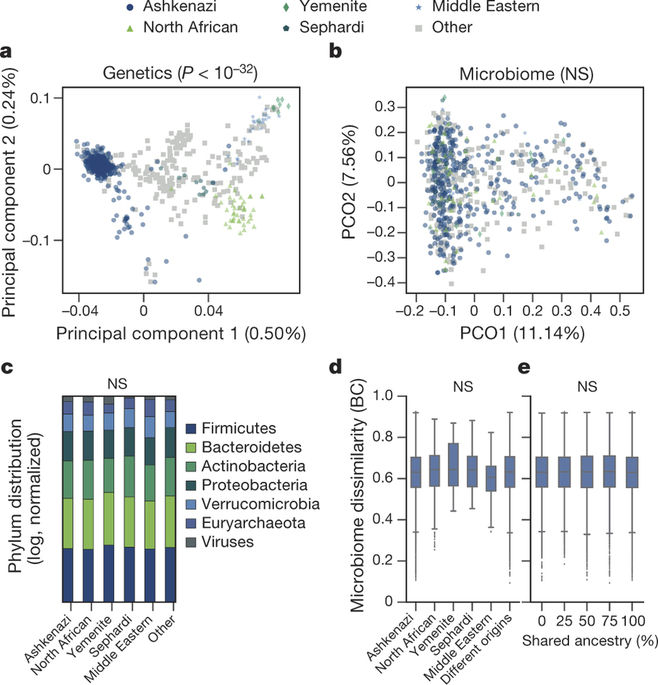Our official English website, www.x-mol.net, welcomes your feedback! (Note: you will need to create a separate account there.)
Environment dominates over host genetics in shaping human gut microbiota
Nature ( IF 64.8 ) Pub Date : 2018-02-28 , DOI: 10.1038/nature25973 Daphna Rothschild , Omer Weissbrod , Elad Barkan , Alexander Kurilshikov , Tal Korem , David Zeevi , Paul I. Costea , Anastasia Godneva , Iris N. Kalka , Noam Bar , Smadar Shilo , Dar Lador , Arnau Vich Vila , Niv Zmora , Meirav Pevsner-Fischer , David Israeli , Noa Kosower , Gal Malka , Bat Chen Wolf , Tali Avnit-Sagi , Maya Lotan-Pompan , Adina Weinberger , Zamir Halpern , Shai Carmi , Jingyuan Fu , Cisca Wijmenga , Alexandra Zhernakova , Eran Elinav , Eran Segal
Nature ( IF 64.8 ) Pub Date : 2018-02-28 , DOI: 10.1038/nature25973 Daphna Rothschild , Omer Weissbrod , Elad Barkan , Alexander Kurilshikov , Tal Korem , David Zeevi , Paul I. Costea , Anastasia Godneva , Iris N. Kalka , Noam Bar , Smadar Shilo , Dar Lador , Arnau Vich Vila , Niv Zmora , Meirav Pevsner-Fischer , David Israeli , Noa Kosower , Gal Malka , Bat Chen Wolf , Tali Avnit-Sagi , Maya Lotan-Pompan , Adina Weinberger , Zamir Halpern , Shai Carmi , Jingyuan Fu , Cisca Wijmenga , Alexandra Zhernakova , Eran Elinav , Eran Segal

|
Human gut microbiome composition is shaped by multiple factors but the relative contribution of host genetics remains elusive. Here we examine genotype and microbiome data from 1,046 healthy individuals with several distinct ancestral origins who share a relatively common environment, and demonstrate that the gut microbiome is not significantly associated with genetic ancestry, and that host genetics have a minor role in determining microbiome composition. We show that, by contrast, there are significant similarities in the compositions of the microbiomes of genetically unrelated individuals who share a household, and that over 20% of the inter-person microbiome variability is associated with factors related to diet, drugs and anthropometric measurements. We further demonstrate that microbiome data significantly improve the prediction accuracy for many human traits, such as glucose and obesity measures, compared to models that use only host genetic and environmental data. These results suggest that microbiome alterations aimed at improving clinical outcomes may be carried out across diverse genetic backgrounds.
中文翻译:

环境在塑造人类肠道微生物群方面主导着宿主遗传学
人类肠道微生物组的组成受多种因素影响,但宿主遗传学的相对贡献仍然难以捉摸。在这里,我们检查了来自 1,046 名具有几个不同祖先起源的健康个体的基因型和微生物组数据,这些个体拥有相对共同的环境,并证明肠道微生物组与遗传祖先没有显着关联,并且宿主遗传学在决定微生物组组成方面的作用很小。我们表明,相比之下,共享一个家庭的遗传无关个体的微生物组组成存在显着相似性,并且超过 20% 的人际微生物组变异与饮食、药物和人体测量相关的因素有关. 我们进一步证明,与仅使用宿主遗传和环境数据的模型相比,微生物组数据显着提高了许多人类特征(例如葡萄糖和肥胖测量)的预测准确性。这些结果表明,旨在改善临床结果的微生物组改变可能会在不同的遗传背景下进行。
更新日期:2018-02-28
中文翻译:

环境在塑造人类肠道微生物群方面主导着宿主遗传学
人类肠道微生物组的组成受多种因素影响,但宿主遗传学的相对贡献仍然难以捉摸。在这里,我们检查了来自 1,046 名具有几个不同祖先起源的健康个体的基因型和微生物组数据,这些个体拥有相对共同的环境,并证明肠道微生物组与遗传祖先没有显着关联,并且宿主遗传学在决定微生物组组成方面的作用很小。我们表明,相比之下,共享一个家庭的遗传无关个体的微生物组组成存在显着相似性,并且超过 20% 的人际微生物组变异与饮食、药物和人体测量相关的因素有关. 我们进一步证明,与仅使用宿主遗传和环境数据的模型相比,微生物组数据显着提高了许多人类特征(例如葡萄糖和肥胖测量)的预测准确性。这些结果表明,旨在改善临床结果的微生物组改变可能会在不同的遗传背景下进行。

























 京公网安备 11010802027423号
京公网安备 11010802027423号